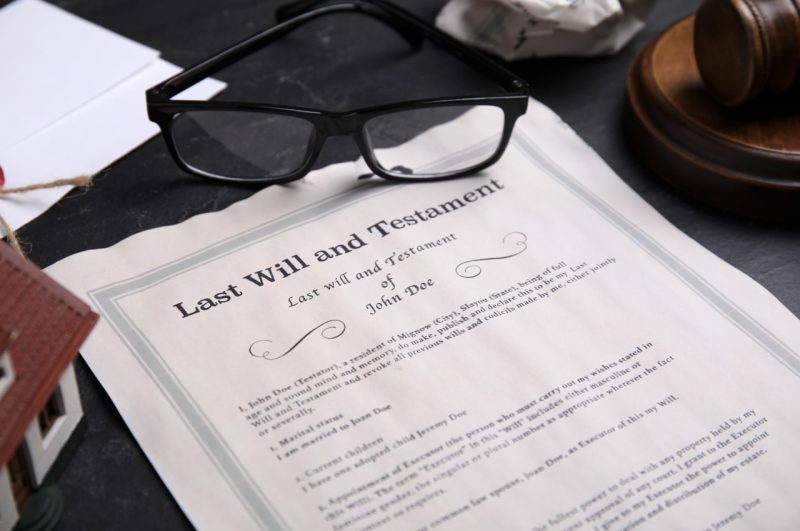What Are The Requirements Of A Valid Last Will In Florida?
What Are The Requirements Of A Valid Last Will In Florida?

Creating a valid Will is essential for anyone in Florida to ensure their wishes are carried out after passing. Knowing the requirements for making one is crucial to ensure that your estate is properly managed and distributed according to your desires. There are many vital elements to consider when constructing a Will.

What Is A Will?
A Will is a legal document allowing individuals to outline how they should distribute their assets and property upon death. Individuals must create a Will to ensure that their possessions are adequately managed and distributed.
A Will can also provide instructions on the guardianship of minor children, payment of debts, and the nomination of executors or trustees.
A Will typically covers real estate, bank accounts, investments, personal belongings, vehicles, and other movable property. It can also include provisions for charitable donations or gifts to family members or friends.
You may also include your wishes regarding burial arrangements in a Will. The document must follow all applicable state laws to bind after death legally.
What Should You Include In Your Will?
Writing a Will is an essential step in the estate planning process. It allows you to determine what happens to your assets and property when you pass away. While every state has requirements for a valid Will, Florida requires explicitly that certain items be included to make it legally binding. Below is a comprehensive list of things one must consist of when writing.
Appointing An Executor
One key element in creating a Will is appointing an executor. An executor carries out the instructions in the Will, ensuring that all the paperwork and legal steps are correctly taken.
When selecting an executor for your Will, choosing someone trustworthy, organized, and familiar with your financial situation is essential. Your executor should also be willing to take on this responsibility – as it can require considerable effort from them.
Consider talking with potential candidates before making any decisions. Name a trusted person to be your Will executor and manage your estate.
Distributing Assets
Deciding how to distribute assets can be a difficult decision, but there are certain things you should include in your Will when it comes to dividing up what you own.
When creating your Will, ensure that all your tangible items, such as houses, vehicles, and furniture, are accounted for. If these items have sentimental value or monetary value associated with them, recipients must understand this clearly.
It is also essential to list any investments or financial accounts you have. Examples include stocks, bonds, or bank accounts since people can easily forget these.
Establishing Guardianship
When planning for the future, having a Will is essential. Establishing guardianship for any minor children in your life should be an integral part of that plan. If you do not have a Will and something happens to you, it’s up to the court to decide who Will become the guardian of those minors in your life. Having a Will ensures you can make this vital decision and provide your loved ones peace of mind.
To ensure that guardianship is appropriately established with just one document, include all pertinent information about the potential guardian in your Will.
You should list their full name, address, contact information, and relationship status. Include any other details relevant to caring for these minors if something ever happens to you.
Designating Beneficiaries
When selecting beneficiaries for your Will, the main factor is who has been crucial in your life, such as family members, friends, and even charities.
Before deciding on any names, it’s best to consult with lawyers who can help ensure that all legal requirements are followed in dividing up the estate. After that’s accomplished, it’s time to decide how much each beneficiary should receive and assign percentages accordingly.
Creating Trusts
Trusts can provide financial security and stability for family members and other beneficiaries. It ensures they have access to the resources they need when the time comes.
Trusts can also help reduce gift taxes and ensure that beneficiaries receive the total value of inheritance without paying additional taxes.
Naming Alternate Beneficiaries
Many people don’t consider the importance of naming alternate beneficiaries in their Wills. It’s essential to ensure backups are in place for your primary beneficiaries, just in case they cannot or do not accept what is given to them.
When writing your Will, think about whom you want to receive your assets when you die. It is equally important to consider possible issues with them accepting or declining the inheritance.
Naming A Personal Representative
A personal representative is an individual or institution appointed by you to handle your affairs if you become incapacitated. This person will ensure your assets and debts are taken care of according to your wishes. It is essential to select someone whom you trust and who understands the legal requirements and obligations involved with this role.
Outlining Funeral Arrangements
Include information about the funeral and memorial services you would like. This will ensure that your wishes are carried out according to what you want.
Including details of funeral arrangements in your Will can help make sure that everything goes as planned. Specify which service you would like, such as a traditional burial or cremation ceremony. More about us.
Additionally, provide instructions on who should officiate the service and what music should be played at the event. List any specific readings or rituals you would like included, such as a eulogy or blessing from a religious leader.
Specifying Digital Assets
Your digital estate could consist of anything from social media accounts and email addresses to online banking accounts or cryptocurrencies. Thinking about whom you want to manage and access these assets after you are gone is essential.
Expressing Wishes For Pets
It is vital to plan for your pets. You should ensure they are provided the care you want them to have if something ever happens to you.
Make sure to designate who should take ownership of the pet and provide instructions on how it should be cared for.
Signing & Dating The Will
Before signing and dating the document, check to ensure all information in the Will is correct and there are no typos or errors. Once everything has been verified, sign the paper in front of two witnesses who can verify your identity and confirm that you signed the document intentionally.
It is also essential that each witness signs the Will, preparing them for any future testimony they may be asked to provide regarding their witnessing of your signature on the Will.
How Can You Make Sure Your Last Will Is Valid?
Creating a valid Will is an essential part of estate planning. Writing a Will is the only way to ensure that your wishes are followed after death. It also helps to prevent potential legal disputes between family members or other beneficiaries. In Florida, there are specific state requirements for a valid Will.
- Make sure the Will is in writing and signed by the testator.
- Make sure the testator is of sound mind and at least 18 years old.
- Name an executor in the Will to ensure the wishes expressed in the Will are carried out.
- Have two witnesses sign the Will. The witnesses must be over 18 years old and have seen the testator sign the Will.
- Have the Will notarized.
- Make sure the Will complies with all state laws in Florida.
When Should You Write Your Will?
The best time to create a Will is as soon as you have any assets or family members who depend on you financially. You should also update your Will if anything changes. Examples of changes are:
- Marital status.
- Number of children.
- Number of grandchildren.
- If you move to another state.
- If there are any significant changes in financial circumstances.
The more straightforward and precise the document is, the fewer complications there may be during probate proceedings after death.
How Should You Store Your Documents?
You must take the necessary steps to ensure that your Will is securely stored and available when needed.
First and foremost, make sure that you keep an original copy of the document in a safe deposit box or fireproof safe at home. Keeping an original in more than one location can help ensure that no matter what happens, a copy is available if needed.
It’s also essential to ensure that more than one person knows where the original document is. Ideally, these people should be trusted family members familiar with the Will’s contents.
The best way to store your Will is with a third-party professional or institution like a lawyer, bank, or trust company. This ensures that only authorized personnel have access to the document, reducing the risk of tampering or destruction.
You can also store the document in a safe deposit box at a financial institution. You can also use an online storage service such as Dropbox or Google Drive if preferred. Whichever option you choose, ensure you provide written instructions on who should receive a copy of the document in case of an emergency and when they should obtain it.
&
Have questions about how to get started on your estate plan or estate needs?
Have questions about how to get started
on your estate plan or estate needs?
Contact the experienced estate planning professionals at The Estate Plan
by calling us at (305) 677-8489.
Contact the experienced estate planning professionals at The Estate Plan by calling us at
(305) 677-8489.

